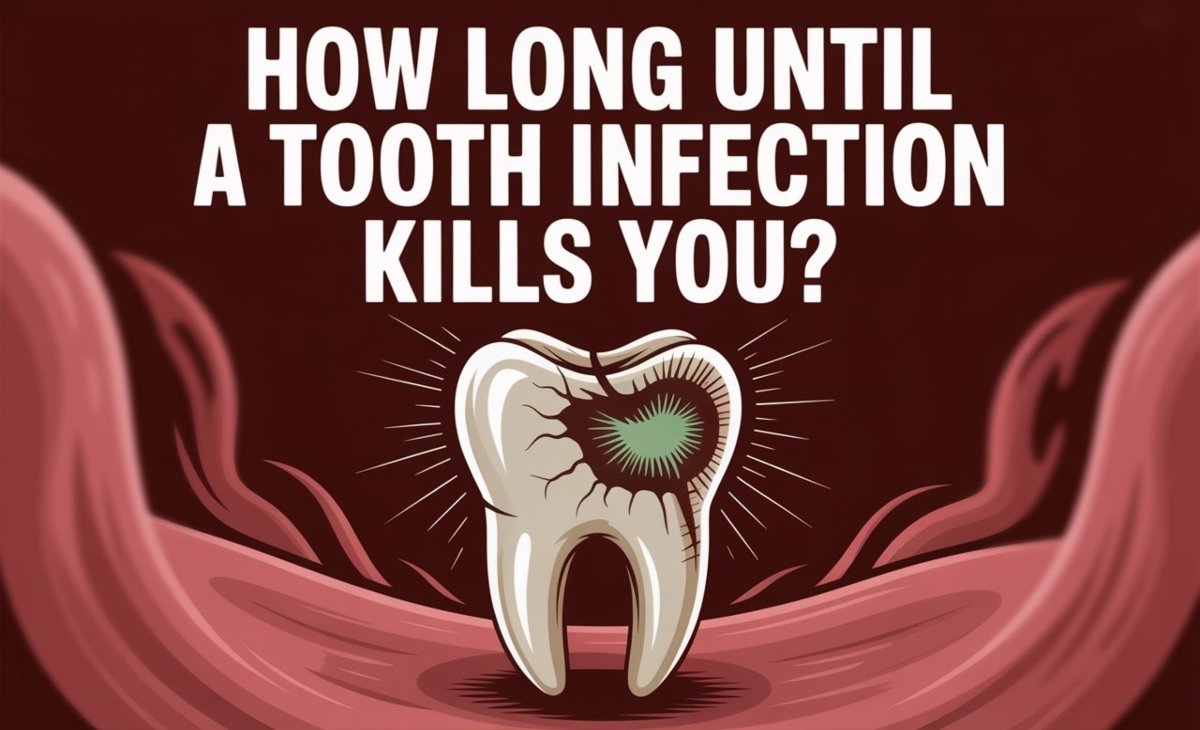A toothache might seem like a small problem, but untreated dental infections can quickly turn dangerous. Many people search for how long until a tooth infection kills you because they underestimate just how serious an abscess or oral infection can become. Left untreated, bacteria from a tooth can spread into the jaw, bloodstream, and even vital organs. While the body sometimes holds off the infection for weeks or months, the risk of severe complications is real. In this article, we’ll break down the warning signs, dangers, and what you should do if you think your tooth infection is worsening.
What Exactly Is a Tooth Infection?
A tooth infection, also called a dental abscess, happens when bacteria invade the inner layers of a tooth. The pulp, which contains nerves and blood vessels, becomes inflamed and fills with pus. This often develops after untreated cavities, cracked teeth, or gum disease.
In its early stages, a tooth infection may cause swelling, pain when chewing, or sensitivity to hot and cold. However, as bacteria spread, the infection can push deeper into the jaw and bloodstream, leading to far more serious consequences.
Why Does a Tooth Infection Matter?
Tooth infections are not just about pain; they are about survival. Here’s why:
- The mouth is full of blood vessels that connect directly to major organs.
- Bacteria from a tooth can spread quickly, sometimes within days to weeks.
- If untreated, infections can lead to sepsis, a life-threatening whole-body reaction.
So when asking how long until a tooth infection kills you, the answer depends on your overall health, the type of bacteria involved, and how quickly you get treatment.
How Long Does It Take for a Tooth Infection to Become Life-Threatening?
The timeline isn’t the same for everyone. In healthy individuals, the body’s immune system can hold off a tooth infection for weeks or even months. But this doesn’t mean it’s safe to ignore.
For some, complications can develop in as little as 48 to 72 hours. If bacteria reach the bloodstream or vital areas like the brain, the infection can spiral into a life-threatening emergency.
That’s why dental professionals stress: never wait to treat an abscess. What starts as a manageable problem can turn fatal if ignored.
Common Life-Threatening Complications of Untreated Tooth Infections
If left untreated, a dental abscess can spread and cause conditions such as:
Sepsis
A dangerous immune response to infection. Symptoms include fever, confusion, rapid breathing, and low blood pressure. Sepsis can be fatal without immediate medical care.
Ludwig’s Angina
A severe infection of the floor of the mouth, under the tongue. It can block airways, making breathing difficult and sometimes impossible without emergency intervention.
Brain Abscess
In rare cases, bacteria travel through blood vessels to the brain, forming abscesses. This condition is extremely dangerous and often requires surgery.
Osteomyelitis
This is a bone infection that occurs when bacteria spread into the jawbone. It causes severe pain, swelling, and long-term damage.
Mediastinitis
When infection spreads into the chest cavity between the lungs, it can cause dangerous inflammation and organ damage.
The bottom line: untreated infections rarely stay “just a tooth problem.”
Who Is Most at Risk?
While anyone can develop complications, certain groups are more vulnerable to severe outcomes from tooth infections:
- Older adults – Aging immune systems make it harder to fight infection.
- Diabetics – High blood sugar impairs healing and increases infection risks.
- Immunocompromised patients – People with conditions like HIV or those undergoing chemotherapy.
- Malnourished individuals – Poor nutrition weakens immune defenses.
For these groups, the timeline from infection to life-threatening illness can be much shorter.
Signs Your Tooth Infection Is Spreading
Recognizing the warning signs early is critical. If you notice any of the following, seek medical attention immediately:
- Severe swelling of the face, jaw, or neck
- Fever and chills
- Difficulty swallowing or breathing
- Persistent throbbing tooth pain
- Swollen lymph nodes under your jaw or in your neck
- Fatigue, dizziness, or confusion
These are red flags that the infection has moved beyond your tooth.
How Dentists Treat Tooth Infections
If caught early, most tooth infections are treatable without lasting damage. Typical treatments include:
- Antibiotics – To kill bacteria and stop the infection from spreading.
- Root canal therapy – Removes infected pulp while saving the tooth.
- Tooth extraction – In severe cases, removing the tooth is the safest option.
- Drainage of abscess – Allows pus to escape, relieving pain and pressure.
Dentists may also recommend pain relievers and warm saltwater rinses to manage symptoms during recovery.
Tips to Prevent Tooth Infections
Good oral hygiene and regular dental care dramatically lower your risk. Here are simple steps:
- Brush and floss daily.
- Visit your dentist twice a year.
- Treat cavities early before they deepen.
- Wear a mouthguard if you grind your teeth.
- Eat a balanced diet to strengthen immunity.
By staying proactive, you can prevent infections from starting in the first place.
Final Words
So, how long until a tooth infection kills you? The truth is, there’s no single timeline. Some people may live with a dental abscess for months, while others face life-threatening complications in just a few days. What matters most is seeking treatment immediately. A toothache isn’t something to ignore—it’s your body’s way of warning you that something is wrong.
If you suspect a tooth infection, don’t wait. Contact your dentist or doctor as soon as possible. Quick treatment can save not just your tooth but your life.
FAQs About Tooth Infections
How long until a tooth infection kills you?
In rare cases, death can occur within days if the infection spreads rapidly. More often, it takes weeks to months, but every untreated infection carries risk.
Can your body fight off a tooth infection naturally?
While the immune system may slow the infection, it usually cannot eliminate it completely. Professional treatment is necessary.
How fast can a tooth infection spread to the brain?
If untreated, bacteria may reach the brain within a few weeks. Symptoms like severe headache, vision changes, or seizures require immediate medical help.
Do antibiotics cure a tooth infection?
Antibiotics help control bacteria but usually need to be combined with dental procedures like a root canal or extraction to fully resolve the issue.





